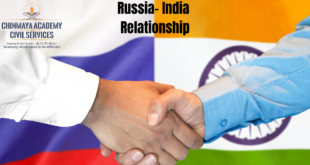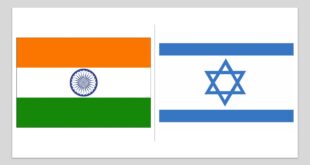- It is no secret that India’s relationship with Germany has traditionally lagged behind its relations with its other European partners such as France.
- Benign mutual neglect coupled with Germany’s primary focus on China are factors, but this appears to be changing rapidly.
- Chancellor Scholz’s two-day visit to India, that began on February 25, 2023, significantly coincided with the first anniversary of Russia’s war on Ukraine, which has been, in Mr. Scholz’s own words, a Zeitenwende or turning point.
- Indeed, the Russian invasion has been a watershed moment in Germany’s security policy, resulting in the abandonment of decades of post-war pacifism towards strategic matters.
- This is evident in Germany’s pledge to boost defence spending to 2% of GDP and provide special funding to bolster the country’s military.
- Russia’s war and China’s assertive posturing have brought into question Germany’s approach of Wandel durch Handel (change through trade), prompting a deep rethink of its energy and trade dependencies towards diversifying economic relations.
- As ties with Russia and China enter uncharted waters, Europe’s increasing prioritisation of values-based partnerships with like-minded countries can advance India-German cooperation.
- In this context, the German government’s coalition agreement in 2021 refers to relations with India among its top foreign policy priorities.
- Scholz’s visit has built on German Foreign Minister Annalena Baerbock’s visit to India in December 2022, and the 6th India-Germany Inter-governmental Consultations, a biannual format of engagement that commenced in 2011, to expand cooperation in defence, trade, clean energy, migration, digital transformation, and the Indo-Pacific.
- His visit assumes greater importance as India holds the G-20 presidency this year and seeks to avoid geopolitics hampering cooperation in the forum.
- Discussions on the Russia-Ukraine conflict and its global repercussions were centre stage as the war continues. Prime Minister Narendra Modi has reiterated India’s commitment to contribute to any peace process.
- In a departure from Germany’s previous Asia policy that centred around China, Mr. Scholz first visited Japan after assuming office in 2021, and later invited Mr. Modi for the 6th Inter-Governmental Consultations to Berlin.
- This enhanced political outreach to Asia is part of Germany’s overall strategy for the Indo-Pacific region which mentions India as a key partner.
- For Germany, the stability of supply chains and trade routes linking Asia to Europe assumes critical importance given its status as Europe’s economic powerhouse and its reliance on exports.
- In an interview preceding his India visit, Mr. Scholz expressed Germany’s intent to enhance its strategic involvement in the region through greater military deployment.
- Germany’s symbolic gesture of sending its frigate Bayern to the Indo-Pacific in 2021, with a stopover in Mumbai (January 2022), was a demonstration of this.
- A recent agreement on India-Germany triangular cooperation involving development projects in third countries is also an important step in this direction.
Defence links
- As New Delhi attempts to diversify from its military dependence on Russia and Berlin reassesses its long-standing arms exports policy, Germany could become an important defence partner for India.
- The meetings included discussions around co-development of military hardware and tech transfers, and a deal worth $5.2 billion where Germany would jointly build six conventional submarines in India could be underway.
- Besides, the first ever France-India-Germany military exercise drill is slated to take place in 2024 towards enhanced security and defence collaboration.
- Yet, it is important for the two countries to set realistic expectations in the security realm.
- Despite their common concerns regarding stability in the Indo-Pacific, Germany does not share a border with China, India has territorial conflicts with the country.
- And despite the lack of German trust in China, Mr. Scholz’s visit there in November 2022 demonstrated how intertwined German industry is with Chinese markets.
- But even while Mr. Scholz emphasises the difficulties in ‘decoupling’ from China, it is encouraging that Germany is drafting a new official China strategy amidst a wider national security strategy.
- India and Germany also cooperate in multilateral forums, as part of the G-4 grouping pushing for United Nations Security Council reform, and as evident in Germany’s invitation to Mr. Modi to attend last year’s G-7 summit.
Trade and technologies
- Germany is India’s largest economic partner in the European Union (EU). Thus, trade naturally figured high on the agenda boosted by the relaunch of the India-EU free-trade agreement negotiations where the Chancellor, travelling with his high-powered business delegation, stated he would “get personally involved”.
- Collaboration in clean energy and green technologies has emerged as the central pillar in the partnership, with the launch of a Green and Sustainable Development Partnership last year and cooperation in the area of green hydrogen.
- The subject of mobility and migration was also under focus given Germany’s shortages of skilled manpower; where technically skilled Indians could help plug this gap.
- While economics comprises the bulk of the partnership, it is refreshing to witness relations steadily evolve into a more wholesome partnership.
- Divergent positions on the war have not undermined India’s regular political engagements with Europe and convergence in areas such as the Indo-Pacific that are cementing the strategic dimension of the partnership. An intensification of the Russia-China axis could further embolden this alignment.
- Against the backdrop of volatile geopolitical shifts, emerging multipolarity, and Europe’s enhanced courtship of India, India’s ties with Germany could be vital in shaping a new global order.
SOURCE: THE HINDU, THE ECONOMIC TIMES, PIB
 Chinmaya IAS Academy – Current Affairs Chinmaya IAS Academy – Current Affairs
Chinmaya IAS Academy – Current Affairs Chinmaya IAS Academy – Current Affairs

